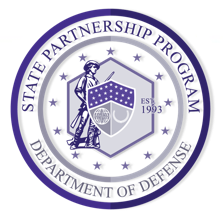
Event Recap—National Guard Bureau’s State Partnership Program: Reflecting on the Past and Looking Toward the Future
On Tuesday, June 20th, ASP hosted a webinar marking the 30th anniversary of the National Guard Bureau’s State Partnership Program (SPP) through a discussion with Colonel Scott C. Humphrey, Chief of the International Affairs Division for the U.S. Air National Guard. The event unpacked the role SPP plays in advancing U.S. interests by building long term strategic partnerships with member nations. The SPP pairs National Guards from every U.S. state and territory with a partner nation to increase security and advance U.S. interests abroad.
Colonel Humphrey provided a brief history of the SPP as well as a personal story about the deeply personal relationships created between the U.S. personnel and SPP nations, followed by the strategic, operational and tactical importance of the connections between Guard members and their foreign military counterparts. The conversation highlighted the extensive benefits of the SPP, and specifically cited the unique opportunity it provides to teach U.S. forces critical soft skills in addition to medical and technological exchanges with foreign militaries in an incredibly cost-effective way. Of note, the SPP maintains all 88 partnerships on a roughly $40 million annual budget, with a per year cost of around $400,000 per partnership via a variety of activities, including training across all levels of warfare, tactical training in natural disaster response and engineering efforts, operational planning and force management, and strategic level key leader engagements. States normally have eight to ten engagements with their partner nations a year, but some states host more than thirty annually. As Colonel Humphrey explained, the SPP also goes beyond military training, taking a whole government approach to creating relationships designed to “export peace” around the world.
While the discussion highlighted the difficulty in creating metrics to show the SPP’s success, several examples were provided to illustrate the critical nature of relationships formed through the SPP. Colonel Humphrey concluded by explaining that everything the National Guard does ties back to communities and at the end of the day, “SPP equals relationships.”





